I’m excited to share my best tips to help you clear up pimples and get glowing skin. If you’re dealing with hormonal breakouts, stubborn spots, or ongoing acne, this guide is for you. It will give you the key steps to improve your skin’s health and shine.
Key Takeaways
- Understand the root causes of acne, including hormonal imbalances and dietary factors
- Establish a consistent skincare routine with effective cleansing, exfoliation, and targeted acne treatments
- Incorporate hydrating and soothing ingredients to maintain a healthy skin barrier
- Explore natural remedies and lifestyle changes to support clear skin
- Address acne scars and hyperpigmentation for a flawless complexion
Understanding Acne: Causes and Triggers
Acne is a common skin issue that affects many people. To fight and prevent acne, knowing the causes and triggers is key. We’ll look at how hormonal changes, diet, and lifestyle affect acne.
Hormonal Imbalances and Acne
Hormonal changes are a big reason for acne. Changes in androgens like testosterone make the skin produce more oil. This can clog pores and cause acne. These changes happen during puberty, the menstrual cycle, and during pregnancy or when using birth control.
Diet and Lifestyle Factors
Diet and lifestyle also play a part in acne. Eating a lot of acne-causing foods like white carbs, sweets, and dairy can make acne worse. Stress, not sleeping well, and some medicines can also trigger acne in some people.
| Hormonal Imbalances | Dietary Factors | Lifestyle Factors |
|---|---|---|
| Testosterone fluctuations | Refined carbohydrates | Stress |
| Menstrual cycles | Sugary snacks | Lack of sleep |
| Pregnancy and contraceptive use | Dairy products | Certain medications |
Knowing what causes acne helps you prevent it. This way, you can take better care of your skin.
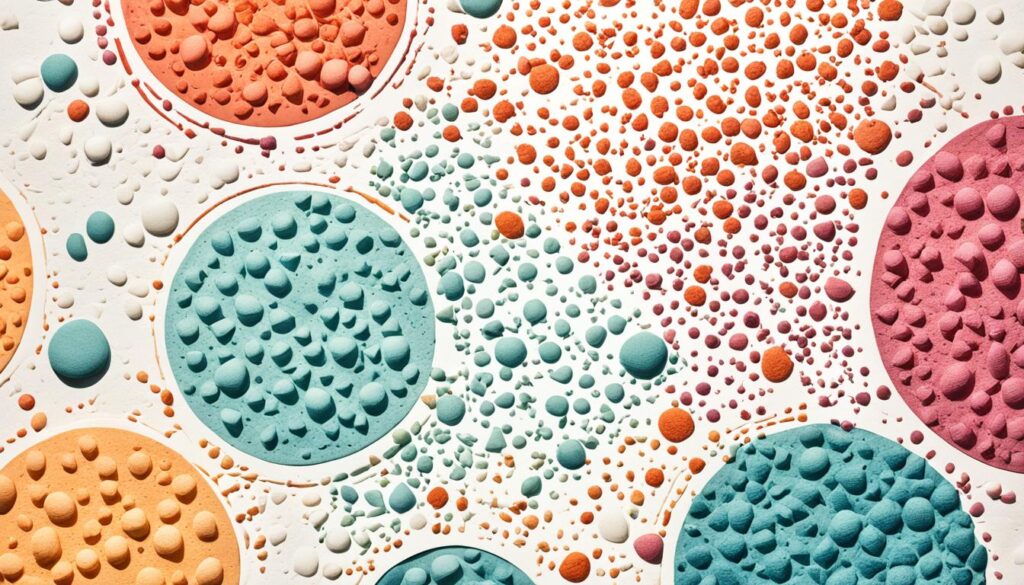
The Importance of a Consistent Skincare Routine
Getting clear, healthy skin is a daily task, not just a one-time job. A consistent skincare routine is the base for a clear face. By using a routine made for your skin type and acne, you can fight breakouts and aim for glowing skin.
Being consistent with your skincare routine is crucial. Using the right products at the same time every day keeps your skin balanced. This helps avoid sudden or ongoing acne. Whether fighting acne or wanting a clear skin glow, a good routine is your best friend.
The Benefits of a Consistent Skincare Routine
- Promotes a healthy skin barrier, which helps to prevent acne-causing bacteria and irritants from entering the skin
- Delivers active ingredients consistently, ensuring maximum efficacy of your acne treatment products
- Reduces the appearance of existing blemishes and helps prevent new breakouts from forming
- Maintains a balanced complexion, minimizing the risk of excessive oil production or dryness
- Enhances the overall radiance and youthful appearance of your skin
Spending a few minutes each morning and night on your skincare routine helps you manage acne and get the clear skin you want. Remember, being consistent is key. With patience and effort, you’ll see your skin get healthier and more clear.
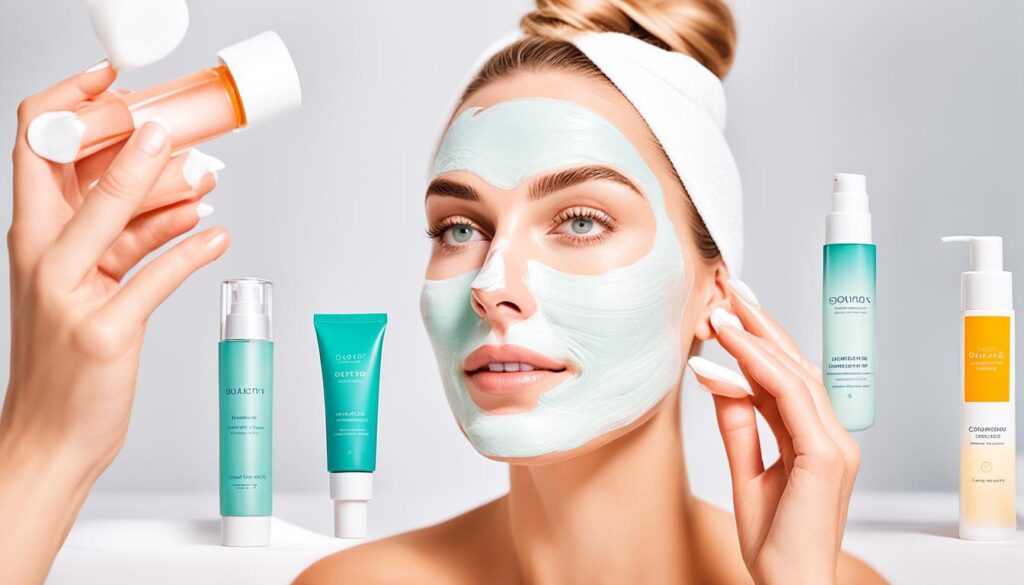
Cleansing: The Foundation of Clear Skin
Getting clear, radiant skin starts with a good cleansing routine. It’s the first step in any skincare plan. By picking the right cleanser and using it correctly, you set the stage for healthy, clear skin.
Choosing the Right Cleanser
Choosing the right cleanser is key to effective cleansing. If you’re fighting acne, pick a gentle cleanser that won’t dry out your skin. Look for ones with salicylic acid or benzoyl peroxide to help clear pores and fight blemishes.
If your skin is dry or sensitive, a creamy cleanser is best. It keeps your skin’s moisture balance. For oily or mixed skin, a foaming or gel cleanser works well. It removes excess oil and dirt without drying out your skin.
Proper Cleansing Techniques
It’s not just about the cleanser you use. How you clean your skin matters too. Start with lukewarm water to avoid drying out your skin. Then, massage the cleanser on with circular motions. Be gentle to avoid irritation.
- Rinse with cool water to close pores and keep moisture in.
- Pat dry with a soft towel, don’t rub or tug.
- Apply your skincare products to tackle specific issues.
Follow these steps daily for clear, healthy skin. Consistency is important. Stick with this gentle routine, and you’ll see great results.
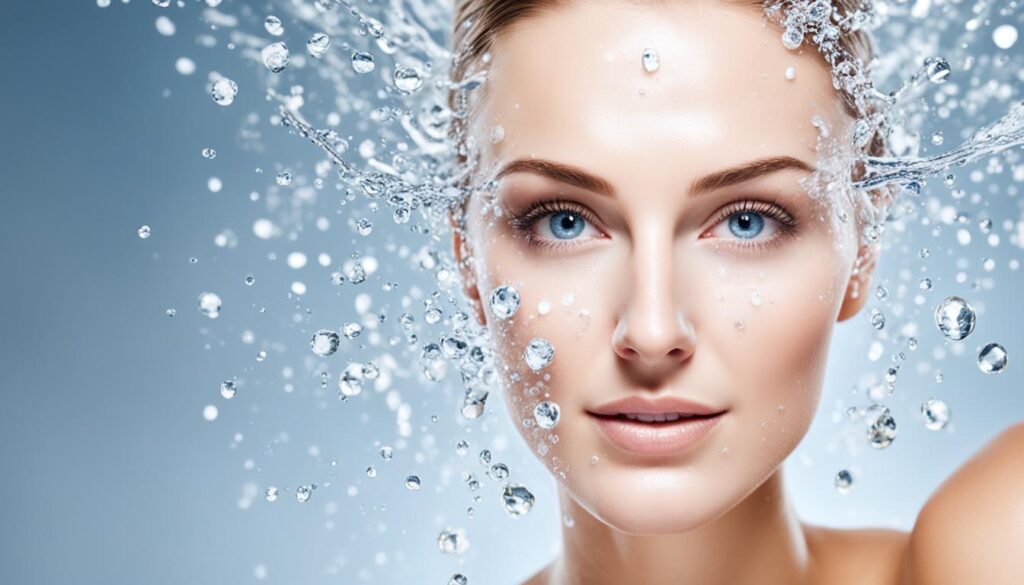
Exfoliation: Sloughing Off Dead Skin Cells
Exfoliation is key for clear, radiant skin. It removes dead skin cells, unclogs pores, and makes skin smooth. Chemical exfoliants are a top choice for clear skin.
Chemical Exfoliants and Their Benefits
Chemical exfoliants like alpha-hydroxy acids (AHAs) and beta-hydroxy acids (BHAs) break down dead skin cells. This makes it easy to remove them. It also helps skin look younger and more radiant.
- AHAs, like glycolic acid and lactic acid, help even out skin tone and fight acne by renewing cells and improving skin.
- BHAs, such as salicylic acid, dissolve in oil and go deep into pores to clear out dirt and excess oil.
Adding chemical exfoliants to your skincare routine offers many benefits:
- It reduces fine lines and wrinkles.
- It helps with acne by making breakouts less frequent and less severe.
- It makes skin smoother and more glowing.
- It lightens acne scars and dark spots.
Start with a low concentration of chemical exfoliants and slowly increase as needed. Always follow the product’s instructions. If you’re unsure, talk to a dermatologist.
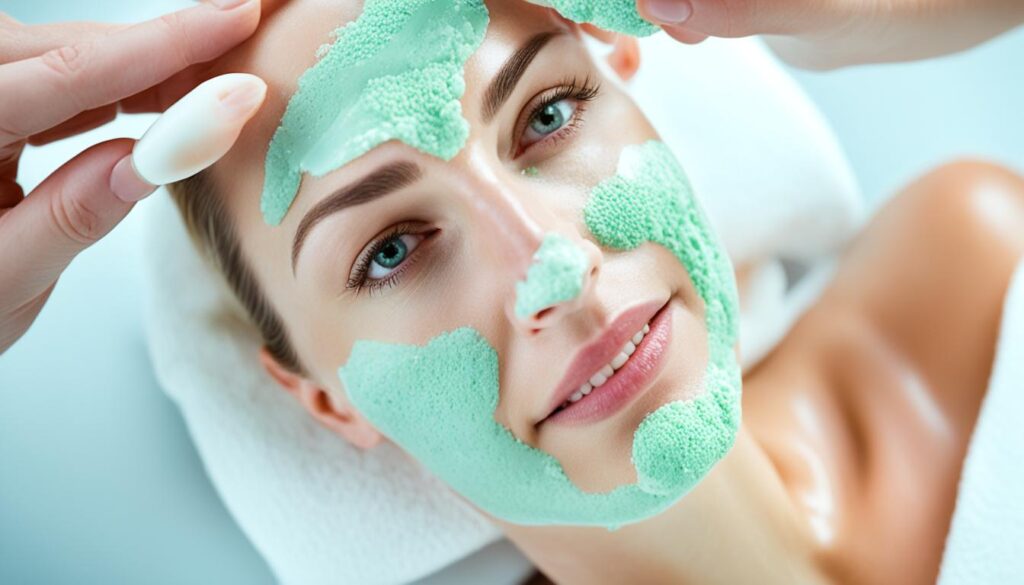
“Exfoliation is the key to unlocking your skin’s true radiance. With the right chemical exfoliants, you can transform dull, uneven complexion into a glowing, youthful canvas.”
| Chemical Exfoliant | Benefits |
|---|---|
| Glycolic Acid | Improves skin texture, reduces fine lines, and fades hyperpigmentation. |
| Lactic Acid | Gentle exfoliation, hydrates and brightens the skin. |
| Salicylic Acid | Effectively clears out clogged pores and treats acne breakouts. |
Treating Acne with Targeted Products
Targeted acne-fighting products can really help with breakouts. Benzoyl peroxide and salicylic acid are two key ingredients that work well against acne. Let’s see how they can clear your skin and stop future breakouts.
Benzoyl Peroxide: A Potent Acne Buster
Benzoyl peroxide is a common treatment for acne. It targets the bacteria in clogged pores. This ingredient kills the bacteria, reduces inflammation, and dries out pimples. It also unclogs pores to stop new pimples from forming.
Adding benzoyl peroxide to your skincare routine can greatly improve your skin’s health and appearance.
Salicylic Acid: A Skincare Superhero
Salicylic acid is another great ingredient for fighting acne. It goes deep into the skin to clear out dead skin cells, oil, and bacteria. This helps prevent breakouts. It also reduces redness and swelling from existing blemishes.
Using products with salicylic acid can help unclog pores, control oil, and make your skin look clearer and more radiant.
When starting with benzoyl peroxide and salicylic acid, start with low concentrations and slowly increase as needed. Being patient and consistent is important for clear, acne-free skin.
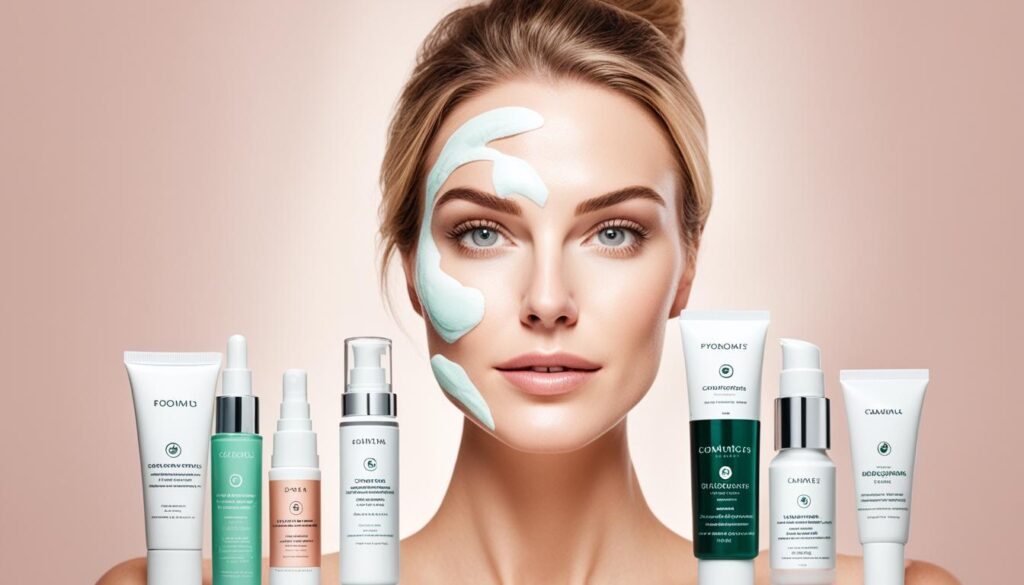
| Ingredient | Benefits | Potential Side Effects |
|---|---|---|
| Benzoyl Peroxide |
|
|
| Salicylic Acid |
|
|
get rid of pimples, acne treatment, skincare tips, clear skin, acne remedies
Getting rid of stubborn pimples and achieving clear skin can seem tough. But, with a good skincare routine and understanding acne causes, you can beat pimples and keep your skin healthy. I’ll share the main strategies and techniques to help you create a skincare plan that fits your skin.
First, let’s talk about the importance of a consistent skincare routine. Cleaning, exfoliating, and using products for acne are key steps. Washing your face twice a day removes dirt and oil that can cause breakouts. Exfoliating removes dead skin and opens up your pores, helping your treatments work better.
For fighting acne, benzoyl peroxide and salicylic acid are great options. Benzoyl peroxide kills bacteria that cause acne. Salicylic acid goes deep into pores to clear them out and stop future breakouts. Adding these to your routine can really help clear your skin.
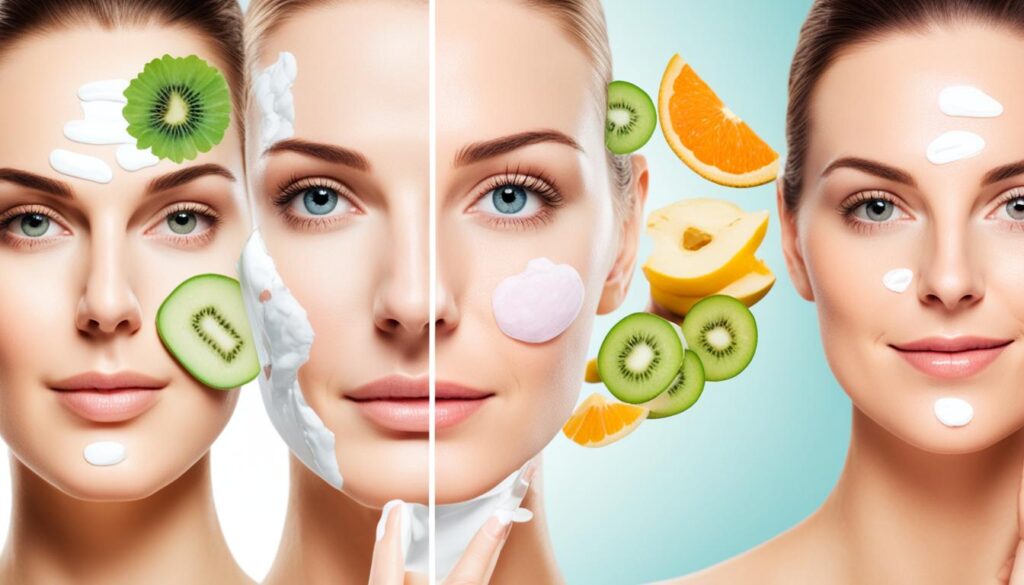
Don’t forget about moisturizing. The right moisturizer keeps your skin balanced and prevents dryness, which can lead to more acne. Also, your diet, stress levels, and sleep quality affect your skin’s health and look.
By using these skincare tips and tackling acne causes, you can say goodbye to pimples and hello to clear skin. Remember, being consistent is important. Stick with your routine and try different products and methods to find what works best for you.
Hydration: Keeping Skin Balanced and Healthy
Keeping your skin hydrated is key to clear, healthy skin. It’s a must-have in any skincare routine. It helps balance and nourish your skin, whether fighting acne or going for clear skin.
Choosing the Right Moisturizer
Not every moisturizer is the same. Picking the right one for your skin type is crucial. Here are some tips to find the best moisturizer for you:
- For acne-prone skin, choose oil-free, non-comedogenic formulas that won’t clog pores.
- Dry skin types do well with richer, creamy moisturizers for deep hydration.
- Combination skin needs a lightweight, gel-based moisturizer to avoid over-hydration and greasiness.
- If you have sensitive skin, avoid fragrances and harsh ingredients. Opt for a gentle, soothing moisturizer instead.
| Skin Type | Ideal Moisturizer |
|---|---|
| Oily/Acne-Prone | Oil-free, non-comedogenic |
| Dry | Rich, creamy |
| Combination | Lightweight, gel-based |
| Sensitive | Gentle, fragrance-free |
Remember, hydration isn’t just about applying any moisturizer. It’s about finding the right one that matches your skin type and needs.
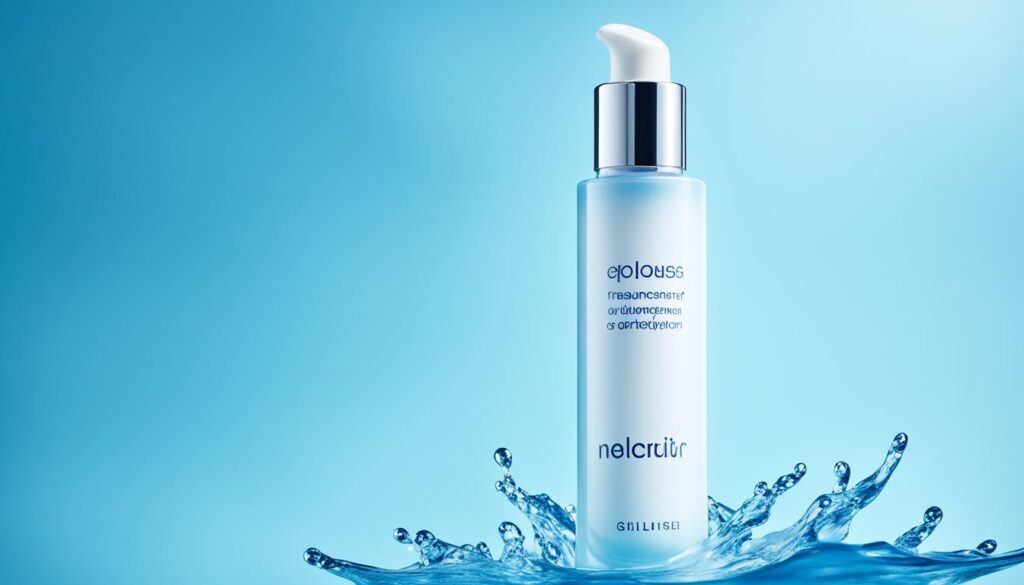
Spot Treatments: Tackling Individual Blemishes
Having a good skincare routine is key for clear, healthy skin. But sometimes, you need spot treatments for specific blemishes and pimples. These products can really help in your fight against acne, giving you a focused way to deal with tough pimples.
There are a few spot treatment options to think about:
- Drying Lotions: These treatments have salicylic acid or benzoyl peroxide. They dry out and shrink pimples. Put them on the spot at night and let them work.
- Targeted Serums: Look for serums with retinoids, sulfur, or tea tree oil. These can treat breakouts and stop new ones from happening.
- Acne Patches: These patches are made of hydrocolloid. Wear them at night to soak up oil and protect the skin from irritation.
When using spot treatments, be careful not to overdo it. Apply them only where you need them. Using too much can dry out your skin. Start with a little and add more if needed. With the right spot treatment, you can fight off blemishes and move closer to clear, glowing skin.
“Spot treatments are a game-changer for tackling persistent pimples and breakouts. They provide a more targeted approach to clear skin.”
Natural Remedies for Acne
There are many natural remedies that can help with acne, besides traditional treatments. Tea tree oil is one such remedy. It has strong antibacterial properties that fight acne-causing bacteria and reduce swelling.
Tea Tree Oil and Its Antibacterial Properties
Tea tree oil comes from the Melaleuca alternifolia plant. It’s known for its many health benefits. For acne, its antibacterial and anti-inflammatory properties make it a great natural solution. It can lessen blemishes, stop new breakouts, and calm irritated skin.
Research shows tea tree oil works as well as benzoyl peroxide in treating mild to moderate acne. It targets the bacteria that cause acne, making it a key tool in fighting acne.
- Tea tree oil can reduce the size and redness of pimples.
- Its antibacterial properties help prevent new breakouts.
- It also has anti-inflammatory properties that soothe the skin.
To use tea tree oil, mix it with a carrier oil like jojoba or coconut oil and apply it to blemishes. Always test it on a small area first to check for any reactions. With regular use, you might see fewer acne and clearer skin.
“Tea tree oil has been shown to be an effective natural remedy for acne, providing a gentle yet powerful alternative to traditional acne treatments.”
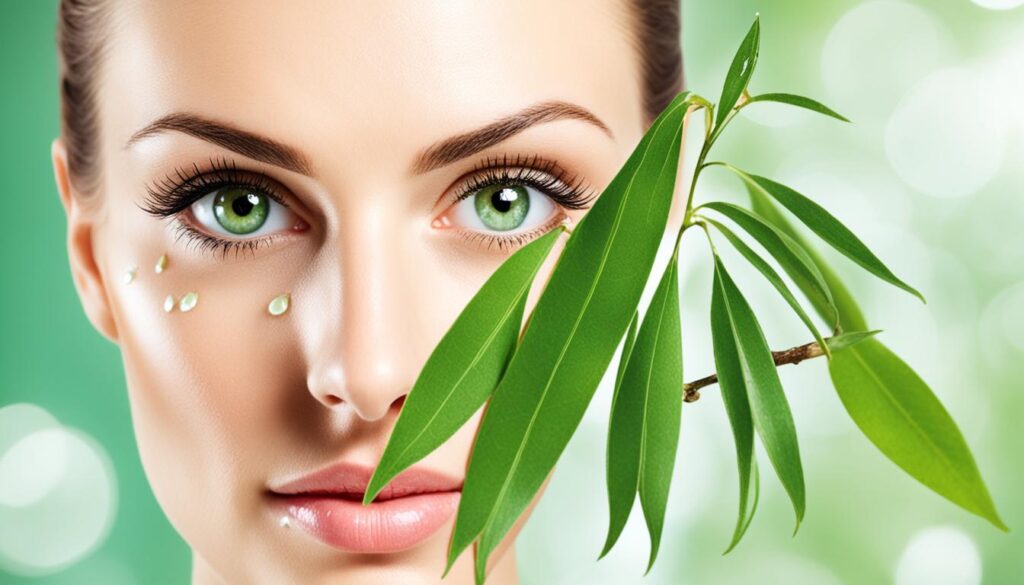
While tea tree oil is great for acne, remember to keep up with a full skincare routine. This includes cleaning, exfoliating, and moisturizing your skin. Using natural remedies like tea tree oil with other effective strategies can help you get the clear, glowing skin you want.
Lifestyle Changes for Clear Skin
Getting clear skin is more than just about the products you use. What you eat and how you live affects your skin’s health and acne. By knowing how diet affects acne, you can make choices that help your skin stay healthy and break out less.
Diet and Acne: Understanding the Connection
What you eat can really change your skin’s health. Some foods can make acne worse, while others can help your skin look clearer. Here’s what you should know about diet and acne:
- High-glycemic index foods, like white bread and sweets, can make inflammation and acne worse.
- Dairy items, especially milk and ice cream, might make acne more likely because they can mess with hormones.
- Omega-3 fatty acids in foods like salmon, walnuts, and flaxseeds can lessen inflammation and acne.
- Fruits and veggies full of antioxidants, like berries, spinach, and tomatoes, fight oxidative stress and help skin health.
Pay attention to what you eat and add acne-fighting foods to your meals. This can help your skin stay healthy and stop breakouts.

“A healthy diet rich in whole, unprocessed foods can be a powerful tool in the fight against acne.” – Dermatologist, Dr. Emily Newsom
Stress Management and Its Impact on Acne
Stress can make acne worse by upsetting the skin’s balance. This leads to more oil and inflammation. It’s important to know how stress affects acne for clear skin.
Stress makes the body release cortisol, a hormone that increases oil production. This oil, along with inflammation, helps acne-causing bacteria grow. So, managing stress is key to preventing and treating acne.
- Engage in regular exercise, such as yoga or meditation, to help reduce stress and promote relaxation.
- Practice stress-relieving techniques like deep breathing, journaling, or engaging in hobbies you enjoy.
- Prioritize self-care activities, such as getting enough sleep, eating a balanced diet, and staying hydrated.
Using stress management techniques daily can boost your health and help with acne. Remember, tackling the main causes of acne is vital for clear skin.
“Stress is not only a trigger for acne, but it can also exacerbate existing breakouts. Finding healthy ways to manage stress is crucial for maintaining clear, healthy skin.”
Dealing with Acne Scars and Hyperpigmentation
Preventing and managing active acne is key, but many also face the lasting effects of past breakouts. Acne scars and hyperpigmentation can lower one’s confidence and make achieving clear skin harder.
Fading Acne Scars with Professional Treatments
There are many professional treatments to help fade acne scars and even out skin tone. Options like laser therapy, chemical peels, and microneedling work by boosting collagen and resurfacing the skin. It’s important to work with a dermatologist to find the right treatment for your scars.
At-home skincare products can also help fade scars and hyperpigmentation. Ingredients like retinoids, vitamin C, and alpha hydroxy acids can be used daily. These products can enhance the effects of professional treatments, helping you get closer to clear, glowing skin.

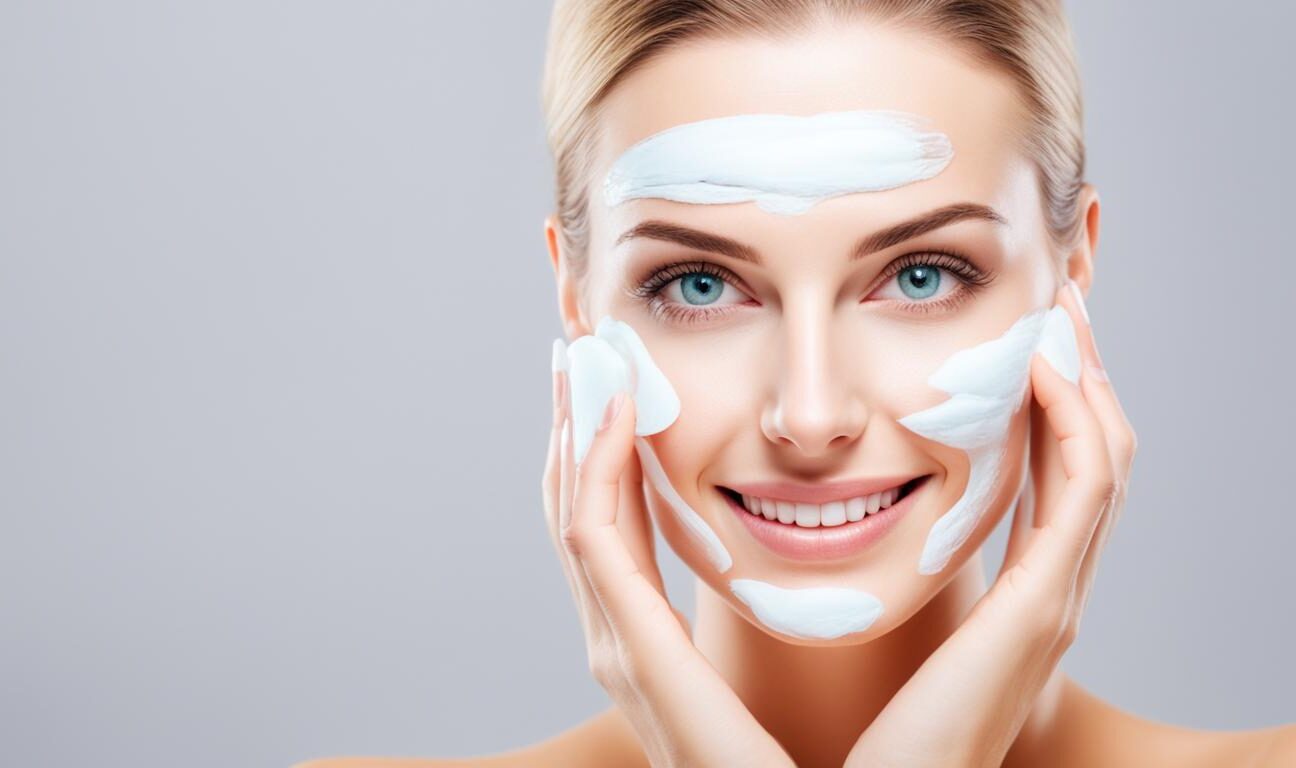
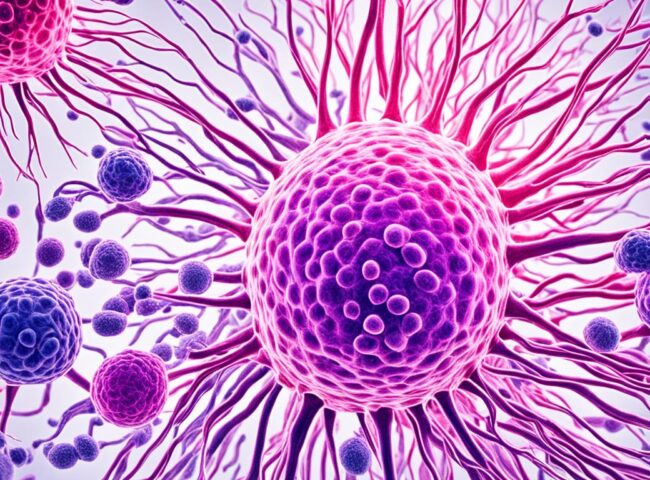




Leave feedback about this